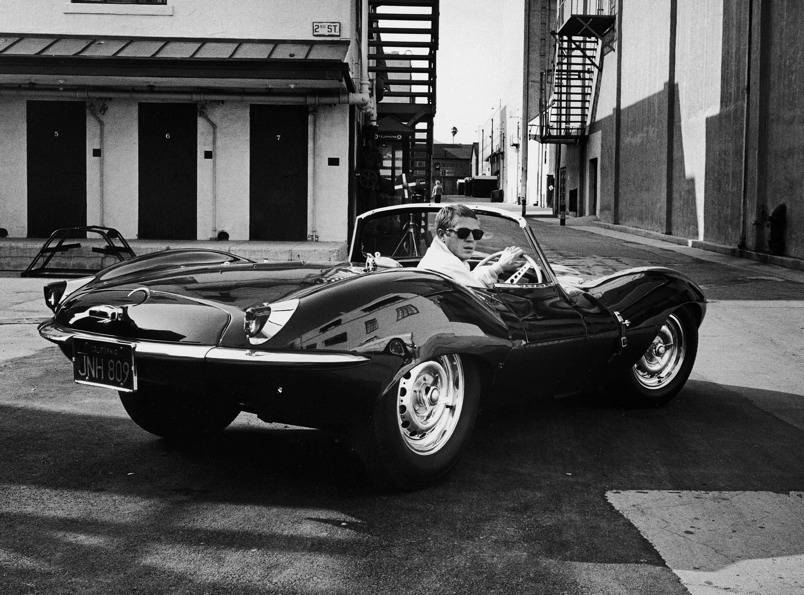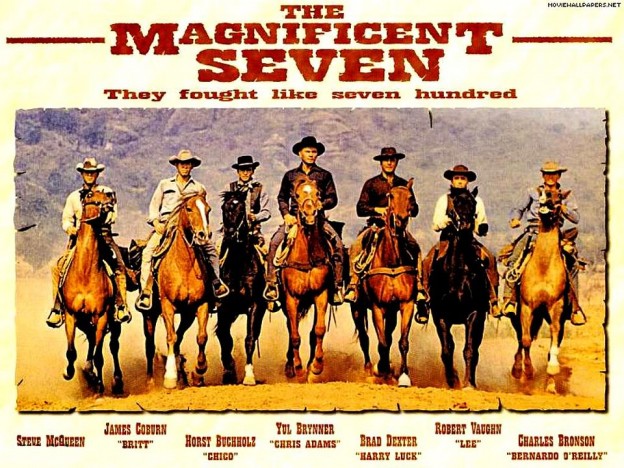Very few movies have ever packed more star power into their two hours than John Sturges’ 1960 Western extravaganza The Magnificent Seven. Featuring a presciently well-chosen collection of actors who would go on to become massive stars, the film is also fascinating for being a remake of Akira Kurosowa’s Seven Samurai with a perfectly logical transformation of milieu from the classic Samurai period of feudal Japan to the Old West of the United States/Mexico border. Highly skilled mercenaries are hired to defend a small, poor village from the depredations of a rampaging bandit and his gang, and Sturges shrewdly swaps swords for six guns even while the plot and characters of the two films remain largely identical. Of course, the ultimate irony is that Kurosowa was in fact striving to emulate a John Ford Western with Seven Samurai, so Magnificent Seven winds up being a Hollywood Western refracted back to its source by way of Japan. But it was Sturges’ singular genius to see how seven huge stars (eight if you count the bandit super villain) could fit together in one action-packed epic.
Sturges had already succeeded brilliantly with several other high wattage blockbusters like Gunfight at the OK Corral, which featured the always sparkling tandem of Burt Lancaster and Kirk Douglas; Bad Day at Black Rock with a one-armed Spencer Tracy being menaced by all-star heavies Robert Ryan, Ernest Borgnine and Lee Marvin; and the WWII action adventure Never So Few, which starred Frank Sinatra, Peter Lawford and Gina Lollabrigida but was stolen by a young Steve McQueen in his breakout film role. Sturges immediately saw McQueen’s potential after the remarkable reaction to his supporting role in Few and teamed him that great bald showman, Yul Brynner, already famous for playing grand exotics like the King of Siam and Pharaoh, as the twin leads for his new project. Brynner would play the cool, black clad Cajun leader of the group of mercenaries, Chris, and McQueen would be his lieutenant, the wry Vin. He then fleshed out the cast with charismatic up-and-comers: Charles Bronson as a Mexican-Irish tough guy with a heart of gold Bernardo O’Reilly; James Coburn as the laconic expert knife thrower Britt; Robert Vaughn as the hunted quick-draw expert Lee who has lost his nerve; and the young German (yes German!) Horst Buckholtz as the immature small town Mexican hothead Chico desperate to join the team of professional gunslingers and prove his worth. Sturges rounded out the Seven with the tough and funny Brad Dexter as the gold-crazy Harry Luck who can’t believe that Chris isn’t playing an angle for all this seeming altruism towards the poor villagers. And perhaps his most inspired casting was to pick the great Eli Wallach for the villainous and cunning Pancho Villa-like raider, Calvera, ably standing up to those formidable paladins and anticipating by six years his tour de force as the scheming, amoral Tuco in Sergio Leone’s The Good, The Bad and the Ugly.
These extraordinary actors all made the most of their uniquely drawn characters and the script always feels well-balanced with plenty of nuance and backstory to make them true individuals and not simply “types”. Sturges truly had the knack for ensembles and complicated story lines with a lot of moving parts and tense action set pieces, as he showed yet again with 1963’s The Great Escape. Clearly Lawrence Kasden’s Silverado owes a great debt to him and one can also see the influence of Magnificent Seven today on super hero action epics with many leads like The Avengers and even Guardians of the Galaxy. He also repeatedly proved that he could recognize stars and put them in situations that captured an audience’s affection and allegiance. It’s no coincidence that after Magnificent Seven Bronson, Coburn and Vaughn all went on to become exceptionally successful in the 60s and 70s. And most significantly, in the course of three films with McQueen, Sturges turned the successful TV star of Wanted Dead or Alive into one of the true icons of world cinema.
Unfortunately, Sturges and McQueen fell out badly during the making of Le Mans in 1971 and never worked together again. Which is a shame because if anyone could have given that racing movie some dramatic impetus and better defined the individuality of the rival drivers it probably would have been Sturges. McQueen was also notoriously difficult and competitive towards Brynner during the filming of Magnificent Seven, the prototypical hungry young actor trying to dethrone the established star. With a variety of little bits of silent business while Brynner was saying his lines McQueen sought to steal the picture from the Hollywood veteran and bitched about everything from Brynner’s pearl handled gun to the size of his horse. But the viewer can never tell that there is anything but camaraderie between Chris and Vin as they assemble the Seven and try to chase off Calvera and his band of banditos. From the moment of their first encounter volunteering to take a dead man up to Boot Hill to their growing admiration for the poor farmers they are defending to the final showdown with the bandits, these two professional gunfighters forge a bond of respect that ties the larger group together. The Magnificent Seven is a Western with many levels of enjoyment — the structure, the cast, the action. That’s why one can watch it over and over again and still get caught up on the classic story of an outnumbered force for good selflessly defending against evil. But it’s that very special chemistry between Brynner and McQueen, Chris and Vin, that remains its biggest pleasure. Rivals off screen, these two Hollywood legends will forever be remembered as the very best of friends on it, riding together to glory.


